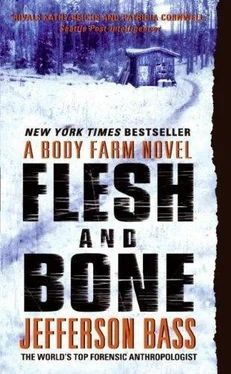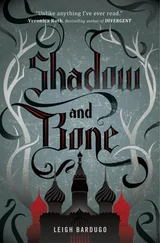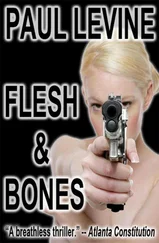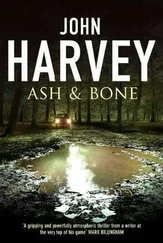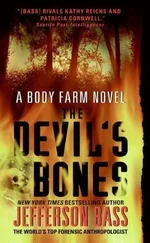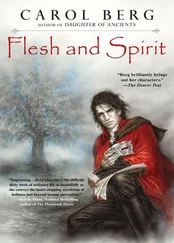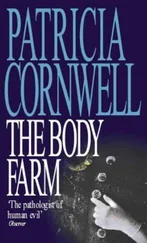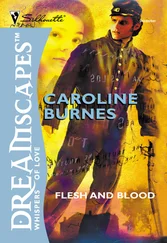Jefferson Bass - Flesh and Bone - A Body Farm Novel
Здесь есть возможность читать онлайн «Jefferson Bass - Flesh and Bone - A Body Farm Novel» весь текст электронной книги совершенно бесплатно (целиком полную версию без сокращений). В некоторых случаях можно слушать аудио, скачать через торрент в формате fb2 и присутствует краткое содержание. Год выпуска: 2007, Жанр: Детектив, на английском языке. Описание произведения, (предисловие) а так же отзывы посетителей доступны на портале библиотеки ЛибКат.
- Название:Flesh and Bone: A Body Farm Novel
- Автор:
- Жанр:
- Год:2007
- ISBN:нет данных
- Рейтинг книги:3 / 5. Голосов: 1
-
Избранное:Добавить в избранное
- Отзывы:
-
Ваша оценка:
- 60
- 1
- 2
- 3
- 4
- 5
Flesh and Bone: A Body Farm Novel: краткое содержание, описание и аннотация
Предлагаем к чтению аннотацию, описание, краткое содержание или предисловие (зависит от того, что написал сам автор книги «Flesh and Bone: A Body Farm Novel»). Если вы не нашли необходимую информацию о книге — напишите в комментариях, мы постараемся отыскать её.
Flesh and Bone: A Body Farm Novel — читать онлайн бесплатно полную книгу (весь текст) целиком
Ниже представлен текст книги, разбитый по страницам. Система сохранения места последней прочитанной страницы, позволяет с удобством читать онлайн бесплатно книгу «Flesh and Bone: A Body Farm Novel», без необходимости каждый раз заново искать на чём Вы остановились. Поставьте закладку, и сможете в любой момент перейти на страницу, на которой закончили чтение.
Интервал:
Закладка:
Ten yards down, I came to a side entrance to the classroom wing. A pair of wooden doors, up half a dozen stairs, was set into a deep archway sheltered from the view of anyone near the main entrance. I trotted up the stairs and studied the doors. They were an old-fashioned kind that met in the middle, with no pillar between them. The lock was in the right-hand door; my hope was that the church custodian had forgotten to engage the vertical bolt that anchored the left-hand door to the floor. If that was the case, a good tug might be enough to swing both doors outward and apart, even if the crash bar was locked. As it turned out, I got even luckier than that. I smelled the aroma of fresh varnish on the wood, and I noticed that a small wedge had been placed between the doors to keep one slightly ajar so the wet varnish wouldn’t glue them together. I opened the wedged door just enough to slip between the varnished edges, then pulled it quickly shut behind me.
My educated guess, my educator’s guess, had been right-I was in a wing of classrooms which I hoped would connect with the nave. I set off down the hallway to find that connection. The hall smelled of musty wax and dirty paper wrappers, the unmistakable scent of crayons that had been gripped by countless little hands. A large puppet theater was tucked into an alcove in the hall, beside a poster of Noah’s ark, jammed with animals. The door of the first classroom featured a poster of Jesus, with the caption “Let the little children come unto me.” Inside the room were miniature wooden chairs and tables, as well as something that resembled a wooden rowboat on rockers. With a jolt, I suddenly remembered one exactly like it from my own childhood, and the tune “Row, Row, Row Your Boat” popped into my head from fifty years before, sung in the voice of Miss Eloise, my sweet-tempered kindergarten teacher.
After three children’s rooms, the last equipped with playpens, cribs, and several cushioned rocking chairs, the hallway intersected with another hall and a stairway. Even before I could hear it, I felt the deep thrumming of a pipe organ down the passage to the left, its bass notes resonating in my core. I passed through a thick doorway arch, which led into an older part of the building; there, a curving passage hugged what I guessed must be the apse of the nave, the semicircular area behind the altar. I turned left into the curve, and within twenty feet I found an arched wooden door helpfully labeled NAVE. It was slightly ajar, and I put an eyeball up to the crack and eased it open another few inches. What I saw made me jump back from the doorway, as if a snake were coiled inside at eye level. Not ten feet away stood the high altar, and to one side, facing me, was the organist. Another ten feet beyond him, farther to my left, was the first row of people, their pew marked with a white bow. I recognized the face of Jess’s ex-husband; on the same pew with him, but several feet away, sat a woman who looked like a seventy-year-old version of Jess. It was her mother, I realized, and it saddened me to think of a mother burying her child. Behind them, blue-suited police officers sat shoulder to shoulder, three pews deep. Behind them, I noticed with a start, was an elegant black woman; her face was half hidden by the broad brim of a hat, but I suspected the face belonged to Miss Georgia Youngblood. Her choice of seat-immediately behind dozens of muscled policemen-virtually confirmed my hunch. I eased the door shut. This vantage point would give me an unmatched view of the ser vice, but it would also leave me dangerously exposed.
As my mind and my pulse raced to the accompaniment of the pipe organ, the music gave me an idea. I’d toured a number of Gothic cathedrals in En gland and France, and most of them had a balcony or mezzanine ringing the entire nave. I wondered if there might be one in this church, since it was neo-Gothic, and I decided to risk another look. I eased open the door again, less than an inch this time, and was rewarded with a glimpse of dark archways twenty feet up. A set of silvery gray organ pipes filled some of the arches, but most of them looked empty, and they appeared to ring the entire apse. I hurried back to the hallway crossing and staircase, and climbed four flights to the upper level. Again turning left, I found another old-fashioned wooden door. This one wasn’t labeled, but it was directly above the other one, and when I laid my hand on it, I felt the wood quivering in time to the organ’s bass notes. At the top of the door-out of the reach of the Sunday school students-was a small latch, the kind found on screen doors throughout Tennessee.
Unhooking the latch, I pushed open the door and found a dark, narrow passage, eight or ten feet long, leading to the arches I’d seen from below. To my left, as I felt my way toward the nearest arch, I could hear one set of pipes; looking across the apse through the narrow arch ahead of me, I saw the other set. In addition to the rumbling bass notes and high trills and all the intervening octaves, I could hear the rush of air through pipes, and the clicking of valves deep within the organ’s mechanism. The arch gave me a bird’s-eye view of the altar and the soaring marble structure that topped it, like a twenty-foot-high doll house.
A white-robed priest stepped slowly into view, carry ing a brass urn about a foot high. He set the urn on a wooden stand in front of the altar, and I realized with a shock that the urn must contain Jess’s “cremains,” the hokey contraction funeral directors had coined for “cremated remains.” From my research, I knew that her cremains-ground-up bits of crumbly bone, whose minerals were the only things to survive the heat of the furnace-would probably weigh somewhere in the neighborhood of five pounds. I knew the chemical composition was mainly calcium, seasoned with a host of trace elements. And I knew that Jess, her essence, was not among the trace elements inside that urn.
As the priest ascended the stairs to the altar itself, the music reached a crescendo that set my very teeth buzzing. Then the music fell away, and the priest began to speak.
“In the midst of life we are in death,” he began. “From whom can we seek help? From you alone, O Lord, who by our sins are justly angered.”
A chorus of voices rang from the nave beyond. “Holy God, holy and mighty, holy and merciful Savior,” the congregation recited, “deliver us not into the bitterness of eternal death.” Ah, my heart answered, but what about the bitterness of empty life? I would have traded places with Jess if I could.
The priest began to chant, a high incantation that had no discernible melody, and I lost the thread of its meaning, circling back instead to the opening words of the ser vice. “In the midst of life we are in death.” No, that’s backward, I thought. In the midst of death, Jess and I were most alive. It was our daily bread. We were oddities, she and I: a doctor who never had a live patient, and an ivory-tower professor immersed to his elbows in death and dismemberment. Could we have made an odd life together, I wondered, sharing space and hearts and bodies in Knoxville or Chattanooga or somewhere in between? The power couple of the dead set, I thought, and smiled at the grim humor even as tears sprang to my eyes for the loss of what might have been. I knew I was grieving for something that never really existed except in my imagination, but the loss cut deeply all the same.
As the congregation read a response to some prompting I hadn’t heard, I shifted my stance, and when I did, I kicked a chair hidden in the dark catwalk. It grated on the stone floor, and the priest looked up in my direction. As he registered my presence, his eyes widened with surprise, then narrowed sharply. I realized that the police had probably briefed him about me, the forbidden intruder, and I suddenly pictured him interrupting the service-Jess’s service-to have me hauled away. I clasped my hands in front of my chest in a gesture of prayer, a gesture whose sincerity I hoped he could see. Maybe he did; maybe he saw sorrow etched in my face, or tears streaking my cheeks; maybe he simply didn’t want to interrupt the ser vice. At any rate, his expression softened, and he turned back to his text. “O God of grace and glory,” he read, “we remember before you this day our sister Jessamine. We thank you for giving her to us, her family and friends, to know and to love as a companion on our earthly pilgrimage. In your boundless compassion, console us who mourn.” He never looked at me again, but at that moment he seemed to be speaking to me, speaking for me, alone among the crowd.
Читать дальшеИнтервал:
Закладка:
Похожие книги на «Flesh and Bone: A Body Farm Novel»
Представляем Вашему вниманию похожие книги на «Flesh and Bone: A Body Farm Novel» списком для выбора. Мы отобрали схожую по названию и смыслу литературу в надежде предоставить читателям больше вариантов отыскать новые, интересные, ещё непрочитанные произведения.
Обсуждение, отзывы о книге «Flesh and Bone: A Body Farm Novel» и просто собственные мнения читателей. Оставьте ваши комментарии, напишите, что Вы думаете о произведении, его смысле или главных героях. Укажите что конкретно понравилось, а что нет, и почему Вы так считаете.
